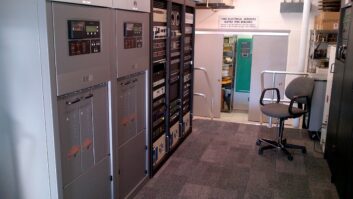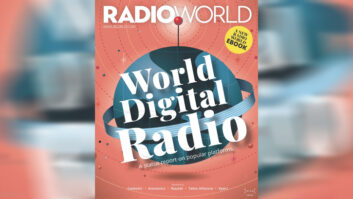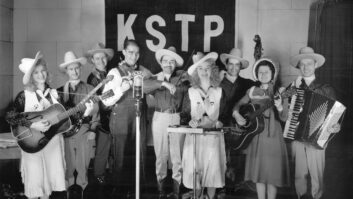The author is president of Whitney Radio, WVOX(AM) and WRTN(FM) in New Rochelle, N.Y. These are excerpts from his remarks to the International Radio-Television Society Foundation Faculty/Industry Seminar in March.
First, I’m hopeful that all the distinguished professors and academicians here assembled from all over the nation can agree that radio is like Lazarus in the Bible. You can’t kill it. Television couldn’t kill it. Cable couldn’t do it in. Nor could the Internet.
The reason is simple and (well-known): radio, being free and “over the air,” is still the medium closest to the people, even in this high-tech, speeded-up, electronic, cyber day and age.
My colleagues at the 93 other stations here in the New York area won’t like me telling you this – (radio) is thus the medium, the companion and refuge of the poor, the disenfranchised, the misunderstood, the lonely and the forgotten of our society. That’s not so good, I suppose, strictly from a “marketing” standpoint.
Now while you’re engaged here today at this high council in Manhattan about the evils – or blessings – of consolidation, and with all the talk of caps, and strategies, and tactics and financial matters, I’m wondering if I could beg just a few minutes to suggest that we also have to decide how we should view the instruments of communication which reside in our care and keeping as fiduciaries and trustees of the public’s airwaves.
And thus: what is a radio station?
Who are we?
Is it merely a device or appliance to convey information and hype about goods and products and services most of us don’t need, and some can ill afford? Do we go to work each day only to preside over jukeboxes?
If that is so, we might as well be John Deere dealers, or holders of a Ford franchise, or stand behind the register at our local Tru-Value hardware store. So I think we need also to decide what it is we’re about.
An industry? Or a profession? Who are we? Are we merely entertainers, or performers, or impresarios who seek only to entertain, distract and titillate?
For if it is only an industry, then it is only about commerce, and dollars and cents, and “ratings,” and formats, and “cumes,” and profit and loss. And it’s all right there in our palm pilots and laptops. And in our bottom lines. And what we do is lost in the air and gone forever. It is commemorated only on a balance sheet in some accountant’s office.
I think it’s a profession. A profession, which affords us, if we do it right, the opportunity to use our franchises to build up the community.
We can even associate with that ancient Hebrew instruction, Tikun Olam: to build up the damn place, to improve the universe. To complete it. Or, as our gifted and brilliant former New York Governor Mario Cuomo constantly reminds broadcasters: we can make our communities “stronger, better, even sweeter” than they are. (You didn’t think an Irishman could summon up Tikun Olam? Be careful, I’ll also hit you with Tzedakah!)
A radio station achieves its highest calling when it resembles a platform, a podium, a soapbox, a forum for the expression of many different viewpoints.
Consolidation
Now as for consolidation, there is no question that locally-owned and locally-operated hometown-community radio stations, operated in the public interest by broadcasters who speak the language of the neighborhoods, are fast disappearing.
Local, regional and community stations are succumbing to the siren song of the big group operators. They are selling out, and independent voices are being replaced by a cookie-cutter cacophony of the same-old, same-old music and often accompanied by vulgar, outrageous and tasteless stunts.
The old-time, working local broadcaster is being replaced by “asset managers” beholden to corporate masters a whole continent away.
“Clusters,” presided over by “market managers,” absentee owners and speculators (trying to cover their assets!) now control most major markets where once those many different, vibrant, worthy voices were heard in the land.
Most stations today are run out of airport lounges by paid-gun, itinerant, journeymen “market specialists” trying to squeeze every last dime out of their “properties.”
And let me just warn you, don’t ever sit next to one of these “market managers” on an airplane! For he or she will speak in a strange, foreign dialect comprised of wonderful business-speak phrases like “economies of scale” … “win-win situations” … “getting it done” … “doin’ what it takes” and that most dreadsome phrase of all: “make it happen!”
I’m afraid this dazzling jargon has replaced quaint old notions like “public trustee,” who operates “for the public interest, convenience and necessity.” It is an undeniable fact that most stations everywhere have fallen to absentee-owners and speculators.
All, however, may not be lost.
For as I suggested last month at Columbia Law School up at Morningside Heights: maybe when they realize they can’t run a thousand or more stations out of San Antonio, they’ll start to dismantle these behemoths themselves and sell off some of those “properties” to independent entrepreneurs who will once more consider that they have a fiduciary relationship to an instrument of communication and who will then steer them back to the service of the people in their communities.
Slippery turf
And so, as you academicians consider the effects of consolidation, I would leave you only with a very clear instruction I received one day from the great, towering New York Senator Jacob K. Javits.
Senator Javits, who was also the father of the War Powers Act (where are you when we really need you!) used to say, “You either believe in the genius of the free-enterprise system, or you do not.” I like the sound of that.
Maybe consolidation is only a temporary circumstance, a temporary fact of life driven by those free-market forces I don’t think we want the government to interfere with.
Someone once said radio is the last turf on which an entrepreneur can run. The turf is getting a little slippery. And maybe we are getting a little greedy about this privilege, which is ours. But I think radio is still the medium closest to the people, and possessed, still, of the greatest potential to do good things for our communities.
And so I would leave you only with my plea that as you go back to your colleges and universities and to your classrooms, you’ll divert some of your best and brightest to radio. It’s a wonderful profession. We need them. And the people we serve need them.
We also need you … to instruct … us.







